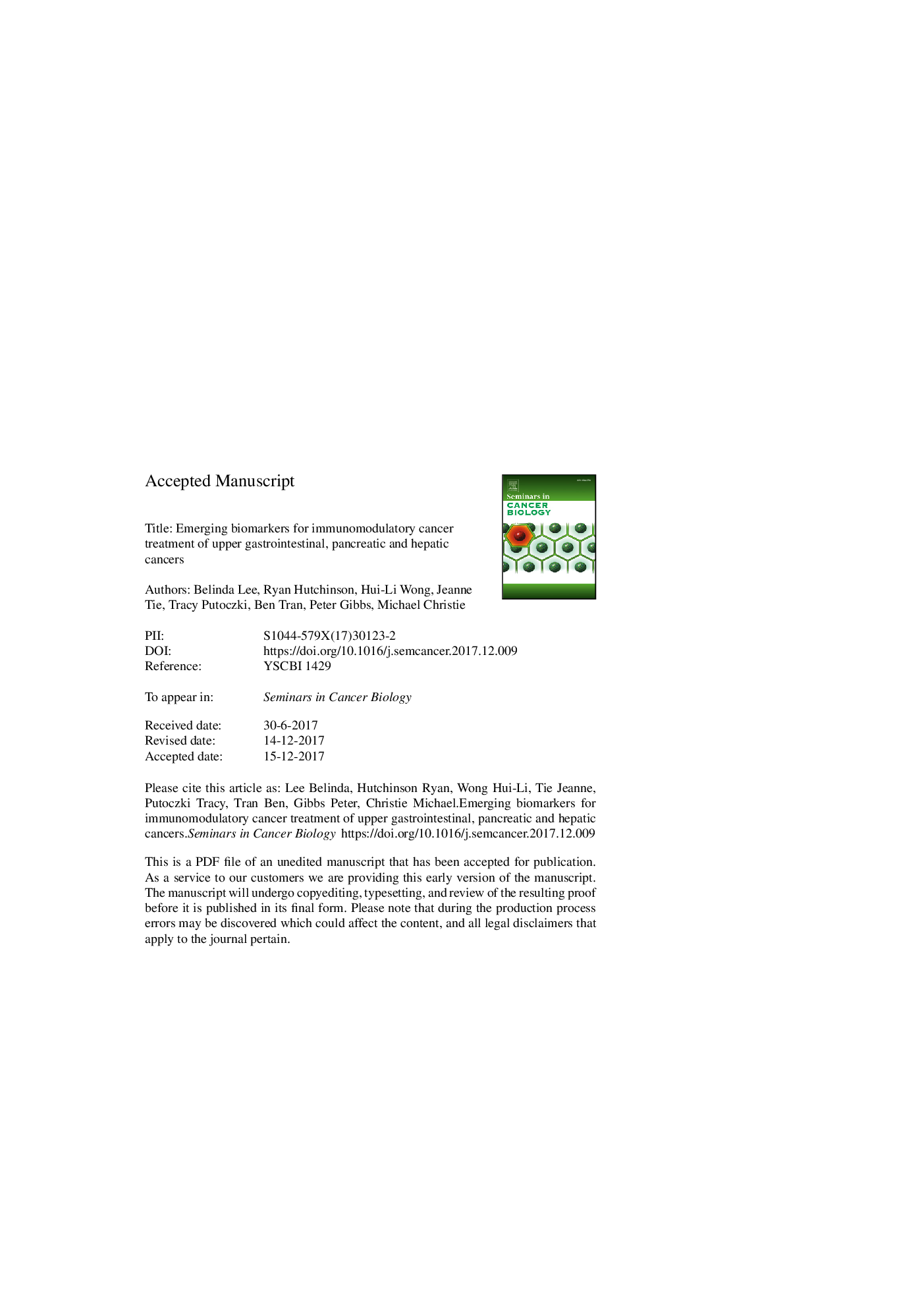| کد مقاله | کد نشریه | سال انتشار | مقاله انگلیسی | نسخه تمام متن |
|---|---|---|---|---|
| 10157004 | 1666441 | 2018 | 37 صفحه PDF | دانلود رایگان |
عنوان انگلیسی مقاله ISI
Emerging biomarkers for immunomodulatory cancer treatment of upper gastrointestinal, pancreatic and hepatic cancers
ترجمه فارسی عنوان
بیومارکرهای در حال ظهور برای درمان سرطان ائوزینوژنیک سرطانهای دستگاه گوارش، پانکراس و کبد
دانلود مقاله + سفارش ترجمه
دانلود مقاله ISI انگلیسی
رایگان برای ایرانیان
کلمات کلیدی
ایمونوتراپی، بیومارکرها، هپاتوسلولار، پانکراس، معده،
ترجمه چکیده
سرطان مری، معده، پانکراس و کبد رایج است و تعداد زیادی از مرگ و میر ناشی از سرطان را به خود اختصاص می دهد. برای بیماران مبتلا به بیماری پیشرفته نیازمند گزینه های جدید درمان است. درمان های ایمن سازی شده از جمله مانع از بازرسی ایمنی، یک رویکرد نوید دهنده امیدوار کننده را با کارایی در سایر انواع تومورهای جامد نشان می دهد. با این حال، تنها بخش کوچکی از بیماران مبتلا به سرطان مری از مریض، معده، پانکراس و کبد به مهار کننده های پست بازرسی واحد پاسخ داده اند و نیاز به نشانگرهایی وجود دارد که پیش بینی واکنش به درمان راهنمای بیماران فردی را پیش بینی می کنند. نشانگرهای پیش بینی کننده ممکن است شامل عوامل اپیدمیولوژیک مانند قومیت، وضعیت ژنوم تومور، نشانگرهای گردش خون، بیان مولکول های بازرسی ایمنی و سایر ویژگی های پاسخ استروما / ایمنی در محل تومور باشد. این بررسی بر روی شاخص های زیست شناسی پیش بینی کننده برای مسدود کردن ایمنی در کارسینوم های دستگاه گوارش، معده، پانکراس و هپاتوسلولار، از جمله زمینه ژنومی و چشم انداز ایمنی که در آن رخ می دهد، تمرکز خواهد کرد. کارسینومهای پانکراس تا به امروز در برابر مهار بازرسی ایمنی مقاوم بوده و بنابراین درمانهای ایمنی در این نوع تومور نیز بررسی شده است.
موضوعات مرتبط
علوم زیستی و بیوفناوری
بیوشیمی، ژنتیک و زیست شناسی مولکولی
زیست شیمی
چکیده انگلیسی
Carcinomas of the oesophagus, stomach, pancreas and liver are common and account for a disproportionately high number of cancer deaths. There is a need for new treatment options for patients with advanced disease. Immunomodulatory treatments including immune checkpoint blockade offer a promising new approach, with efficacy shown in other solid tumour types. However, only a small proportion of patients with carcinomas of the oesophagus, stomach, pancreas and liver have responded to single agent checkpoint inhibitors, and there is a need for markers that are predictive of response to guide treatment of individual patients. Predictive markers may include epidemiological factors such as ethnicity, the genomic status of the tumour, circulating markers, expression of immune checkpoint molecules, and other features of the stromal/immune response at the site of the tumour. This review will focus on predictive biomarkers for immune checkpoint blockade in oesophageal, gastric, pancreatic and hepatocellular carcinomas, including the genomic context and immune landscape in which they occur. Pancreatic carcinomas are largely resistant to immune checkpoint inhibition in trials to date, therefore emerging immunomodulatory treatments in this tumour type are also reviewed.
ناشر
Database: Elsevier - ScienceDirect (ساینس دایرکت)
Journal: Seminars in Cancer Biology - Volume 52, Part 2, October 2018, Pages 241-252
Journal: Seminars in Cancer Biology - Volume 52, Part 2, October 2018, Pages 241-252
نویسندگان
Belinda Lee, Ryan Hutchinson, Hui-Li Wong, Jeanne Tie, Tracy Putoczki, Ben Tran, Peter Gibbs, Michael Christie,
